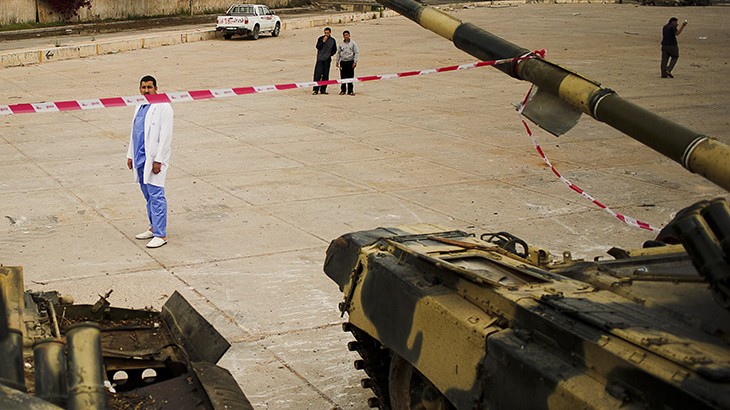Common ethical principles of health care in conflict and other emergencies

The World Medical Association (WMA), the International Committee of Military Medicine (ICMM), the International Council of Nurses (ICN), and the International Pharmaceutical Federation (FIP), representing more than 30 million people from both the military and civilian realms, have adopted the "Ethical Principles of Health Care in Times of Armed Conflict and Other Emergencies", a first-of-its-kind code of ethics that provides a common core for these major international health care organizations.
This document marks an important step towards the protection of health care, with the signatory's organizations showing a cohesive front against all forms of disrespect of ethical principles affecting the access to and the delivery of health care in armed conflict and other emergencies.
Common code to protect health care workers from violence
Consistent information gathered by the ICRC through the Health Care in Danger initiative shows that, in armed conflict and other emergencies, health–care personnel are often coerced to act against health-care ethics, or are victims of threats and subjected to deprivation of liberty for acting in accordance with the ethical principles of their profession.
Within the framework of the HCiD project, WMA, ICMM, ICN and FIP were consulted by the ICRC with the aim of these organizations agreeing on a common denominator of ethical principles of health care applicable in times of armed conflict and other emergencies. The document is the result of these consultations.
With the adoption of the Ethical Principles of Health Care in Times of Armed Conflict and Other Emergencies, the five organizations reinstate the importance of respect of ethical principles of health care for the full implementation of International Humanitarian Law and the protection of health care.
The code enumerates the principles guiding the relationship between patients and health-care workers, and contemplates issues such as discrimination, abuse of privileges, confidentiality, and torture. The principles underlying this relationship apply in times of armed conflict and other emergencies, thereby facilitating the oft-arduous application of ethics in wartime. In this sense, these ethical principles of health care constitute a significant negotiation tool for health-care personnel (in and beyond the humanitarian domain) with the authorities and other relevant actors.
What organizations are saying about the ethical principles
"Civilian and military health-care organizations share the common goal of ensuring the safety of their personnel and other health assets and the delivery of impartial and efficient health care, in the full respect of ethical principles and whatever the circumstances".
Major General (ret) Dr. Roger Van Hoof, Secretary General of the ICMM
"This tool is a major advancement for the protection of health professionals and patients. As health professionals, our primary task is to preserve health and to alleviate suffering, with humanity and dignity of the person concerned, with no discrimination of any kind, whether in times of peace or of armed conflict or other emergencies".
Dr. Xavier Deau, President of the WMA
"Delivering health services to victims of conflict without distinction or discrimination is an increasingly complex challenge in modern conflicts. This is why the code of ethics is so uniquely important. This set of principles will help to demonstrate that the 5th century BC Hippocrates oath remains as important and valid as ever – whether friend or foe, all human beings have the right to medical care, and medical professionals have the right to provide it".
Peter Maurer, President of the ICRC
"In times of unrest, health professionals face hugely challenging situations, and ethics can be put under pressure, which may adversely affect our prime concern: the care of patients. This new code of ethics reflects our strong commitment to show a united front against all forms of violation of ethical principles. The principles in this code provide clear guidance and can be referred to whenever needed".
Luc Besançon, FIP General Secretary
"To achieve best patient outcomes professionals need to work together. Excellence in practice requires each professional to deliver his or her part in a timely and consistent manner. Especially during conflict, life or death often depends on everyone playing their full part. This code provides the common foundations that facilitate optimum working".
David Benton, Chief Executive Officer, ICN
More information
- Watch the video of the panel debate marking the launch of the Ethical Principles
- Learn more about the Health Care in Danger project and how to protect health care
The International Pharmaceutical Federation is the global federation of national associations of pharmacists and pharmaceutical scientists, and is a non-governmental organisation in official relations with the World Health Organization. With 132 member organisations FIP represents more than three million experts in medicines, supporting the responsible use of medicines around the world.
The World Medical Association is the global federation of National Medical Associations representing the millions of physicians worldwide. Acting on behalf of patients and physicians, the WMA endeavors to achieve the highest possible standards of medical care, ethics, education and health-related human rights for all people.
The ICMM is an International and Intergovernmental organization created in 1921 whose primary mission is to maintain and strengthen the bonds of cooperation and knowledge between the Armed Forces Medical Services of all Member States.
The International Council of Nurses is a federation of more than 130 national nurses associations representing the millions of nurses worldwide. Operated by nurses and leading nursing internationally, ICN works to ensure quality nursing care for all and sound health
policies globally.


